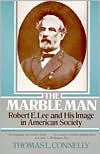

 |

|

The average rating for The Marble Man: Robert E. Lee and His Image in American Society based on 2 reviews is 3.5 stars.
Review # 1 was written on 2017-12-16 00:00:00 Jose Gutierrez Jose GutierrezThough people often don't make the distinction, there is an important difference between history and the past. Simply put, the past is everything that happened before now, while history is how we interpret it. The past has happened and cannot be changed; how we interpret it, though, changes constantly. Sometimes this is because of different perspectives or a greater awareness of the effects or changing values. But there are also times when history changes because of the determination of a few to cement a particular interpretation that serves a specific set of goals. At its core Thomas Connelly's book is about one such effort. In it he describes how a small group of dedicated people committed themselves to the goal of iconizing Robert E. Lee. Their very success is reflected in the enduring perception of Lee as one of the great commanders of military history, one whose ability might have enabled the Confederate cause to endure. As Connolly explains, such perceptions were far from universal in the immediate aftermath of the war, as figures such as Albert Sidney Johnston, P. G. T. Beauregard, and (especially) Stonewall Jackson were esteemed just as highly or even more so by Southerners. Upon Lee's death in 1870, however, a small gathering consisting mainly of former officers of the Army of Northern Virginia and people associated with Washington College united in agreement to preserve Lee's memory, beginning a process that would define how Americans remembered not just Lee, but the entire Civil War. Though many of the people involved in this effort did so out of admiration for Lee, Connelly highlights the self-interested motivations of some of the key participants. Foremost among them was Jubal Early, a former subordinate of Lee's and one of the leading proponents of the "Lost Cause." Connelly notes that Early's championing of Lee's reputation as a military commander not incidentally had the effect of bolstering his own stature, helping to gloss over his mistakes at the battle of Gettysburg. He and others became zealous defenders of Lee's reputation, campaigning for statues and producing laudatory descriptions of Lee's life and generalship while savaging any accounts which argued otherwise. One effect of this was to turn the Virginia theater into the decisive one of the war ' a shift which reflected the Virginia-centric leadership of the Lee memorialization movement and which often came at the expense of the role of the other states of the Confederacy. By the turn of the century, Lee's image was undergoing a further transformation from a Southern hero into a national one, as a new generation romanticized his seemingly flawless personality and military genius, cementing his ironic status as an American hero. Though this image has since come under increasing criticism,their efforts endure today both in the republished books that embody this view and in the statuary prominently displayed throughout the country. Though originally published four decades ago, Connelly's book remains a valuable study of Lee. His description of the posthumous sanctification of Lee provides a perceptive explanation of how the general became the preeminent symbol of the Lost Cause, eclipsing even the leader of the Confederacy himself. The recent controversy over Confederate monuments demonstrates just how relevant Connolly's analysis remains to understanding our nation today, as anyone seeking to understand it or the development of popular perceptions of the Civil War more generally cannot afford to ignore this important and unique book. |
Review # 2 was written on 2011-08-14 00:00:00 Robert Feilke Robert FeilkeThis book charts Robert E. Lee's rise from famous general to an almost cultish figure after the Civil War and to the present day. The book does not argue whether Lee deserves this status, but instead charts the making of a myth. After the Civil War, Lee was admired in the South, but not overly adored. That adoration was reserved for Stonewall Jackson. However, after Lee's death, ex officers of his army started making the myth of Lee as the perfect man. In part, they were trying to justify how a "good cause" could lose the war, and to cover their own wartimes blunders. Thus, Lee was raised to almost deific status, while Longstreet, one of this lieutenants, was denigrated and blamed for the South's losses. This cult was maintained by twisted retellings of history and threats among the Confederate memoir writers following the war. Any attempt to show Lee as anything but perfect was viciously attacked in the media by the other officers, and the offenders' deeds during the war were excoriated. This is a fascinating study of how myths are made. |
CAN'T FIND WHAT YOU'RE LOOKING FOR? CLICK HERE!!!